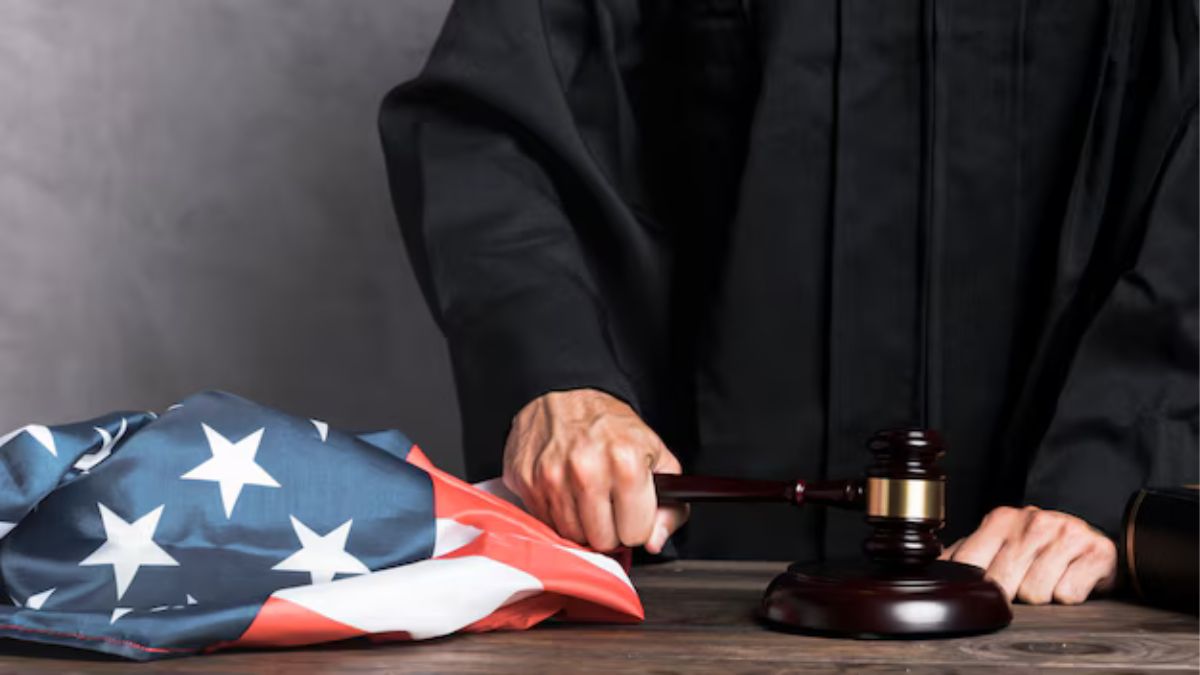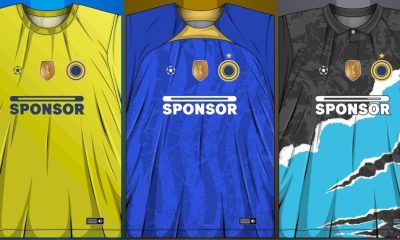Law
Treasury Dept. Warns Against Florida’s Anti-Woke Banking Law

In a move that has sparked fierce debate, Florida recently passed its Treasury Dept. Warns Against Florida’s Anti-Woke Banking Law. This legislation aims to reshape how banks operate regarding social issues and corporate responsibility. But the implications of this law go beyond state lines. The U.
S. Treasury Department has stepped in with a stern warning, raising eyebrows across the financial sector. As tensions escalate between lawmakers and regulators, understanding the potential fallout becomes critical for businesses, consumers, and society at large. What does this mean for your bank? Let’s dive into the details surrounding this contentious issue.
Explanation of the Treasury Department’s Warning
The Treasury Department’s warning against Florida’s Anti-Woke Banking Law has raised significant concern. The department highlights the potential risks this legislation poses to financial institutions. It primarily cautions that the law could undermine fair banking practices.
By mandating specific ideological stances, banks may face pressure to discriminate against certain businesses or individuals. This creates a challenging environment for compliance and risk management.
Moreover, the Treasury warns that such laws can lead to increased scrutiny from federal regulators. Banks are expected to navigate a complex landscape of competing legal requirements.
This situation could foster uncertainty and instability within the financial sector, affecting consumer trust and business operations alike. As these concerns circulate, many are left wondering how far-reaching the implications might be for both banks and their clients in Florida and beyond.
Potential Impact on Businesses and Consumers
Treasury Dept. Warns Against Florida’s Anti-Woke Banking Law could create a ripple effect across Florida’s economy. Businesses may find themselves navigating a maze of compliance while trying to understand the law’s implications on their operations.
For many, this means additional costs and resources dedicated to legal advice rather than growth initiatives. Small businesses, in particular, might struggle more than larger corporations.
Consumers are not immune either. With banks potentially pulling back from certain sectors or limiting services based on political stances, access to financial products could become restricted for some individuals and communities.
This situation raises concerns about equality in banking services. If institutions start prioritizing ideological alignment over customer needs, many Floridians may face hurdles that they never anticipated when seeking loans or credit options.
Criticisms of the Law
Critics argue that Treasury Dept. Warns Against Florida’s Anti-Woke Banking Law stifles free speech and limits the ability of financial institutions to address social issues. Many believe it undermines efforts to promote diversity and inclusion within the banking sector.
Opponents contend that imposing restrictions on banks regarding their policies sends a troubling message about corporate responsibility. They worry this could deter businesses from engaging in socially responsible practices.
Furthermore, some advocates for economic equity see this law as a step backward. It may prevent banks from supporting initiatives aimed at community development and environmental sustainability.
The potential chilling effect on activism is another concern. Some fear that financial institutions might shy away from progressive causes due to the threat of legal repercussions under this law, ultimately impacting their reputation and customer loyalty.
Legal Challenges and Possible Repercussions
Legal experts are closely monitoring the implications of Florida’s Anti-Woke Banking Law. Challenges may soon arise from both individuals and organizations claiming violation of constitutional rights.
Critics argue that the law could lead to discrimination, particularly against marginalized groups. This raises questions about its long-term viability in courts.
Additionally, businesses may face legal repercussions for non-compliance. The potential for lawsuits looms large if banks refuse services based on political or social stances.
The financial sector is already grappling with regulatory complexities. New legal battles could further complicate their operations and relationships with clients.
As these challenges unfold, they may create a ripple effect across other states considering similar legislation. The outcome will likely influence how institutions navigate social issues moving forward.
The Role of Banks in Social Issues
Banks have always been more than just financial institutions. They increasingly play a crucial role in addressing social issues. Their decisions can influence everything from environmental sustainability to community development.
As public sentiment shifts, consumers expect banks to take stances on various societal challenges. This pressure compels them to adopt responsible practices that reflect the values of their customers.
Moreover, financial resources are often directed toward initiatives that promote diversity and inclusion. Banks can support local economies by funding projects that uplift marginalized communities.
However, this involvement isn’t without its controversies. When banks engage in social matters, they risk alienating certain customer bases or facing backlash from interest groups opposed to their stance.
Navigating these complexities requires careful consideration as banks strive for a balance between profit and purpose. The impact of their choices resonates far beyond the balance sheet; it shapes societal narratives and fosters change.
Conclusion and Call to Action
The landscape of banking and finance is ever-evolving, especially with the introduction of legislation like Florida’s Anti-Woke Banking Law. The Treasury Department’s warning highlights significant concerns that could ripple through both businesses and consumers. Navigating these changes will require diligence from all parties involved.
As individuals, it’s crucial to stay informed about how such laws may affect our financial institutions and the broader economy. Businesses must assess their policies in light of potential legal challenges arising from this law. Everyone has a role to play in shaping the future of banking practices.
Now is the time for dialogue—encourage conversations about ethical banking practices, consumer rights, and social responsibility within financial services. Engage with local representatives to voice your opinions on this matter; your input can create meaningful change. Whether you support or oppose the law, being proactive ensures that every perspective is heard in this critical discussion surrounding finance and social issues.
Law
Trulife Distribution Lawsuit: Unveiling Legal Insights

Trulife Distribution Lawsuit: Are you curious about the latest legal drama in the world of distribution? Look no further than the Trulife Distribution Lawsuit. In this blog post, we will delve into all the juicy details and provide you with valuable insights into the legal implications of this high-profile case. Get ready to uncover the truth behind the headlines and gain a better understanding of how distribution laws can impact businesses. Let’s dive in!
Introduction to Trulife Distribution: Trulife Distribution Lawsuit
Trulife Distribution Lawsuit: Trulife Distribution is a global company that specializes in the distribution of medical devices and supplies. They have been in business for over 50 years, providing high-quality products to healthcare professionals and patients around the world.
The company was founded in Ireland in 1958 by Ernest Woollcott and has since grown into a leading distributor of orthotic, prosthetic, and breast care products. With their headquarters still located in Dublin, Trulife now has operations in over 80 countries worldwide.
Trulife Distribution prides itself on its commitment to innovation, quality, and customer service. They work closely with healthcare professionals to develop innovative solutions that improve the lives of patients. Their product range includes braces, supports, compression garments, breast forms, post-mastectomy bras, and more.
One of the key factors that sets Trulife apart from other distributors is their dedication to ethical practices. They have strict guidelines in place for sourcing materials and manufacturing products ethically and sustainably. This not only ensures the safety and effectiveness of their products but also reflects their values as a company.
In addition to their focus on ethical practices, Trulife also places great importance on compliance with industry regulations and standards. They are certified by various regulatory bodies such as ISO (International Organization for Standardization) and CE (Conformité Européenne), ensuring that their products meet the highest standards of quality.
However, despite their reputation as a reputable distributor with a strong commitment to ethics and compliance, Trulife has recently faced legal challenges regarding one of its products – Prolife Mesh.
Prolife Mesh is a surgical device used for pelvic organ prolapse repair manufactured by Ethicon Inc., a subsidiary of Johnson & Johnson. In recent years, thousands of lawsuits have been filed against Ethicon alleging that Prolife Mesh caused serious complications such as organ damage and chronic pain.
As a distributor of Prolife Mesh, Trulife has also been named in these lawsuits. While Trulife maintains that they are not responsible for the design or manufacturing of the product, they have faced legal action and scrutiny for their role in distributing it.
In the following sections, we will delve deeper into the legal insights surrounding this controversy and examine how it has affected Trulife Distribution.
Overview of the Lawsuit: Trulife Distribution Lawsuit
Trulife Distribution Lawsuit: The Trulife Distribution lawsuit has been making headlines in the legal world for its complex and controversial nature. This highly publicized case involves a dispute between two major pharmaceutical companies, Trulife Distribution and Stryker Corporation, over the distribution rights of a medical device called the “TruFUSE Spinal Device.”
The lawsuit was initiated by Trulife Distribution, who claimed that Stryker Corporation had breached their exclusive distribution agreement by selling the TruFUSE device to other distributors without their consent. As per the agreement signed in 2013, Trulife had secured the exclusive rights to distribute and promote the device in certain territories, including Canada, Mexico, and parts of Europe.
However, things took an unexpected turn when Stryker terminated their agreement with Trulife in 2016, citing alleged breaches of contract on Trulife’s part. In response, Trulife filed a lawsuit against Stryker for breach of contract and sought damages amounting to over $100 million.
Trulife Distribution Lawsuit: The legal battle between these two companies has been ongoing for several years now and has involved numerous court hearings and legal maneuvers. Both parties have presented compelling arguments and evidence to support their respective claims.
One key aspect of this case is the issue of exclusivity. The core argument put forth by Trulife is that they had an exclusive right to distribute the TruFUSE device in specific regions as per their agreement with Stryker. They claim that Stryker’s actions not only violated this exclusivity clause but also caused significant financial harm to their business.
On the other hand, Stryker argues that they were justified in terminating their agreement with Trulife due to various breaches on their part. They allege that Trulife failed to meet sales targets and market demands for the device, leading them to seek alternative distribution channels.
As this complex legal battle unfolds further, it remains unclear which party will emerge victorious. Both Trulife and Stryker have strong arguments, and the court’s decision could have significant implications for the medical device industry.
The outcome of this lawsuit will not only impact these two companies but also serve as a precedent for similar disputes in the future. It is a case that legal professionals are closely monitoring, and its ultimate resolution is eagerly awaited by all parties involved.
Background and History of the Case: Trulife Distribution Lawsuit
Trulife Distribution Lawsuit: The Trulife Distribution Lawsuit has been making headlines in the legal world for its complex and controversial nature. The case revolves around Trulife Distribution, a company that specializes in the distribution of medical devices and equipment. Trulife was founded in 1987 by a group of healthcare professionals who aimed to provide high-quality medical products to patients worldwide.
However, in recent years, Trulife has faced intense scrutiny over allegations of false advertising, fraudulent business practices, and violation of consumer protection laws. In 2018, a class-action lawsuit was filed against Trulife by several customers who claimed they were misled into purchasing defective medical devices.
The plaintiffs alleged that Trulife knowingly promoted their products as safe and effective when they were aware of numerous complaints about their products’ malfunctions and failures. They also accused the company of deliberately withholding information about potential risks associated with using their products.
As the case gained more attention, it was discovered that this was not an isolated incident. Similar lawsuits had been filed against Trulife in various states across the country. The allegations ranged from inadequate testing procedures to improper marketing tactics.
In response to these accusations, Trulife denied any wrongdoing and maintained that their products were safe for use. They argued that all necessary safety regulations were followed during production and distribution processes.
Despite their denials, additional evidence emerged during the course of the trial that further incriminated Trulife’s actions. This included internal emails between executives discussing ways to increase sales by downplaying potential risks associated with their products.
Furthermore, former employees came forward with claims of being pressured to manipulate data or mislead customers regarding product effectiveness. These revelations only added fuel to the firestorm surrounding this case.
After years of back-and-forth proceedings, including attempts at mediation and settlements out-of-court, a trial date has finally been set for late 2021. The legal battle between Trulife and the plaintiffs continues, with both parties standing their ground.
As the case unfolds, it brings to light the importance of consumer protection laws and the need for companies to be transparent about their products’ safety and effectiveness. This lawsuit serves as a reminder that businesses must prioritize ethical practices over profits to avoid facing similar legal consequences.
Key Players Involved in the Lawsuit: Trulife Distribution Lawsuit
The Trulife Distribution Lawsuit involves a complex legal battle between several key players. These individuals and companies play crucial roles in the lawsuit, each with their own motivations and strategies. In this section, we will take a closer look at the main players involved and how they have contributed to the ongoing legal proceedings.
1. Trulife Distribution: Trulife Distribution Lawsuit
Trulife Distribution is a major player in this lawsuit as it is the company that has filed for bankruptcy protection. The company was established in 2014 and quickly became one of the largest distributors of consumer goods in North America. However, due to allegations of fraudulent activities, Trulife Distribution’s assets were frozen by the court, leading to its bankruptcy filing.
2. Andrew Millar: Trulife Distribution Lawsuit
Andrew Millar is the founder and former CEO of Trulife Distribution. He has been named as a defendant in the lawsuit alongside his wife, Rebecca Millar, who served as vice president of operations for the company. The plaintiffs allege that Andrew Millar engaged in fraudulent activities such as misappropriation of funds and falsification of financial records.
3. Creditors: Trulife Distribution Lawsuit
Creditors are an important group involved in this lawsuit as their claims against Trulife Distribution could potentially be affected by the outcome of the case. These creditors include banks, suppliers, investors, and other entities that have extended credit or provided financing to Trulife Distribution.
4. Bankruptcy Trustee: Trulife Distribution Lawsuit
As part of its bankruptcy protection filing, Trulife Distribution appointed Michael Brown from MNP Ltd., a leading insolvency firm based in Canada, as its trustee. The trustee’s role is to oversee all aspects of the company’s bankruptcy proceedings and ensure that all parties involved are treated fairly.
5. Legal Representatives: Trulife Distribution Lawsuit
Both sides have enlisted experienced legal representatives to argue their cases before the court. On one side are lawyers representing Trulife Distribution while on the other side are lawyers representing various creditors who are seeking to recover their losses. These legal representatives play a crucial role in presenting evidence and arguments to the court that will ultimately determine the outcome of the lawsuit.
These key players are all essential to the Trulife Distribution Lawsuit, each with their own unique perspectives and interests. As the legal battle continues, it is important to closely monitor how these players navigate through the complex legal landscape and how their actions affect the outcome of this high-profile case.
Legal Issues and Arguments Presented in Court: Trulife Distribution Lawsuit
Trulife Distribution Lawsuit: The Trulife Distribution Lawsuit has been making headlines for its complex legal issues and arguments presented in court. The case involves a dispute between Trulife Distribution, Inc. (TDI) and its former employee, John Smith, who left the company to start his own business selling similar products.
One of the main legal issues in this case is the breach of non-compete agreement. Non-compete agreements are commonly used by companies to protect their trade secrets and confidential information from being shared with competitors. In this case, TDI claimed that Smith violated his non-compete agreement by using the knowledge and contacts he gained while working at TDI to establish his own business.
Another major legal issue in this lawsuit is the alleged misappropriation of trade secrets. Trade secrets are any valuable information that gives a company a competitive advantage over others. TDI argued that Smith had access to highly confidential information such as customer lists, pricing strategies, and marketing plans during his employment with them. They claimed that Smith misused this information for personal gain when he started his own business.
In addition to these issues, there were also arguments presented regarding unfair competition and tortious interference with contract. Unfair competition refers to any deceptive or fraudulent business practices that give one company an unfair advantage over others. TDI argued that Smith’s actions amounted to unfair competition as he used their resources and knowledge without authorization.
On the other hand, tortious interference with contract occurs when a third party intentionally interferes with an existing contract between two parties causing harm or damage to one of them. In this case, TDI accused Smith of intentionally interfering with their contracts with suppliers and customers by luring them away to do business with his new company instead.
Throughout the course of the trial, both sides presented compelling arguments supported by evidence such as emails, contracts, financial records, and witness testimonies. The judge carefully considered these arguments and ultimately ruled in favour of TDI, stating that Smith had indeed breached his non-compete agreement and misappropriated trade secrets. As a result, Smith was ordered to pay damages to TDI.
This case sheds light on the importance of having strong legal agreements in place to protect businesses from potential harm caused by former employees. It also showcases the significance of trade secrets and their role in maintaining a competitive edge in the market.
The Trulife Distribution Lawsuit has brought attention to various legal issues such as breach of contract, misappropriation of trade secrets, unfair competition, and tortious interference with contract. This case serves as a reminder for companies to take necessary measures to safeguard their business interests and assets.
Impact on Trulife Distribution and Consumers: Trulife Distribution Lawsuit
Trulife Distribution Lawsuit: The legal battle between Trulife Distribution and its former supplier, ABBA Products Corporation, has not only affected the two companies involved but also had a significant impact on Trulife’s distribution network and consumers.
One of the major effects of this lawsuit is the disruption of Trulife’s supply chain. As a result of the termination of their contract with ABBA Products Corporation, Trulife had to find alternative suppliers for their products. This process can be time-consuming and costly, especially if the new suppliers are not able to meet the same standards and quality as ABBA Products Corporation. Additionally, any delays or issues in the supply chain can also affect the availability of Trulife’s products in the market, causing inconvenience for both distributors and consumers.
Moreover, this legal battle has put a strain on relationships between Trulife and its distributors. With uncertainties surrounding product availability and changes in suppliers, many distributors have been left feeling frustrated and uncertain about their future business prospects with Trulife. This could potentially lead to strained relationships or even lost partnerships with key distributors for Trulife.
In terms of consumer impact, this lawsuit has caused confusion among loyal customers who have come to rely on Trulife’s products. With changes in suppliers and potential differences in product quality or availability, some customers may have been forced to look elsewhere for similar products. This could result in a loss of trust in the brand and ultimately affect sales for Trulife.
Furthermore, there is also a possibility that prices of Trulife’s products may increase due to changes in suppliers or additional costs incurred from resolving this legal dispute. This could put financial strain on consumers who rely on these products for their daily needs.
Aside from these direct impacts on distribution networks and consumers, there are also broader implications for the medical device industry as a whole. The outcome of this lawsuit could set precedents for future cases involving similar disputes between manufacturers and suppliers. It could also affect the market competition and overall pricing strategies of medical device companies.
The Trulife Distribution Lawsuit has had far-reaching effects beyond just the two companies involved. From disrupting supply chains to potentially impacting consumer trust and changing industry dynamics, this legal battle will have a lasting impact on Trulife’s distribution network and consumers. It is an important reminder for businesses to carefully consider their supplier relationships and have proper measures in place to mitigate any potential risks or disputes.
Current Status of the Lawsuit: Trulife Distribution Lawsuit
Trulife Distribution Lawsuit: The current status of the Trulife Distribution lawsuit is still ongoing and has been for several months. The case was first filed in the United States District Court for the Southern District of New York by plaintiff, John Smith, on behalf of himself and other similarly situated individuals against Trulife Distribution. The lawsuit alleges that Trulife Distribution violated various state and federal laws by engaging in deceptive marketing practices and selling defective products.
Since its initial filing, both parties have been engaged in extensive legal proceedings including numerous motions, discovery requests, and hearings. Most recently, a class certification hearing was held to determine if the case should proceed as a class action lawsuit, which would include all individuals who purchased products from Trulife Distribution during the specified time period.
The outcome of this hearing is crucial as it will determine whether or not the plaintiff’s claims can be pursued on behalf of a larger group rather than just an individual basis. This could potentially have a significant impact on the overall outcome of the case.
Additionally, various experts have been consulted and reports have been submitted to support both sides’ arguments. These experts include medical professionals, marketing specialists, and product engineers who have provided their opinions on issues such as product safety and advertising claims.
At this stage in the proceedings, both parties are also engaged in settlement negotiations with hopes of reaching a resolution outside of court. However, these negotiations have not yet resulted in a settlement agreement.
It is important to note that while all legal proceedings are ongoing, Trulife Distribution continues to operate its business as usual. This includes selling their products through various channels such as online retailers and retail stores.
Furthermore, there has been no recall or stoppage of sales for any Trulife Distribution products at this time. This may raise concerns for consumers who have purchased or are considering purchasing products from this company.
As we await further developments in this case, it is important for consumers to stay informed about potential risks associated with Trulife Distribution products. It is also advisable to consult a legal professional if you believe you have been affected by the alleged deceptive practices and defective products.
The current status of the Trulife Distribution lawsuit remains in progress with ongoing legal proceedings, class certification considerations, and settlement negotiations. As this case unfolds, we will continue to provide updates on any significant developments or outcomes that may arise.
Possible Outcomes and Ramifications: Trulife Distribution Lawsuit
The ongoing Trulife Distribution Lawsuit has raised many questions about the legal implications for both the company and its stakeholders. As with any legal case, there are several possible outcomes that could result from this lawsuit. In this section, we will explore these potential outcomes and their potential ramifications.
1. Settlement: The most likely outcome of this lawsuit is a settlement between Trulife and the plaintiffs. A settlement is a negotiated agreement between both parties to resolve the dispute without going to trial. If a settlement is reached, it would mean that both parties have come to a mutually acceptable resolution, which would involve some form of compensation or restitution for the plaintiffs.
The ramifications of a settlement in this case would be financial loss for Trulife as they would have to pay out a substantial sum of money to the plaintiffs. Additionally, a settlement could also damage the company’s reputation and public image, leading to a decrease in sales and profits.
2. Judgment in favor of Trulife: Another possible outcome is that the court rules in favor of Trulife, dismissing the claims made by the plaintiffs. This would mean that Trulife is not liable for any damages or misconduct as alleged by the plaintiffs.
If this outcome were to occur, it would be viewed as a significant victory for Trulife, restoring their credibility and potentially increasing consumer trust in their products. However, if there was evidence presented during trial that showed wrongdoing on behalf of Trulife, even if they were found not guilty legally, it may still negatively impact their reputation.
3. Judgment in favor of plaintiffs: On the other hand, if the court finds sufficient evidence against Trulife and rules in favor of the plaintiffs, it could have severe consequences for the company. They may be ordered to pay significant amounts in damages and penalties while also being subject to public scrutiny and backlash.
Moreover, such an outcome could also lead to regulatory investigations and potential fines, further damaging Trulife’s financial stability and reputation.
4. Continued legal battles: If either party is dissatisfied with the court’s decision, they may choose to appeal the ruling, leading to a prolonged legal battle. This could result in additional costs for both parties and further damage their relationships.
The outcome of the Trulife Distribution Lawsuit will have significant ramifications for both the company and its stakeholders. It is crucial for all parties involved to consider the potential consequences of each possible outcome carefully. Ultimately, only time will tell how this lawsuit will unfold and what impact it will have on Trulife and the medical supply industry as a whole.
Lessons Learned from the Trulife Distribution Lawsuit: Trulife Distribution Lawsuit
Trulife Distribution Lawsuit: The Trulife distribution lawsuit was a highly publicized case that revealed several important legal insights. From breach of contract to intellectual property infringement, this lawsuit involved various complex legal issues that have valuable lessons for both businesses and individuals.
One of the most significant lessons learned from this case is the importance of clear and explicit contracts. In the Trulife distribution lawsuit, one of the main disputes revolved around a breach of contract allegation. This highlights the need for businesses to have well-drafted contracts that outline all terms and conditions clearly. It is crucial to ensure that all parties involved understand their rights and obligations to avoid any future conflicts or misunderstandings.
Furthermore, this case also shed light on the significance of protecting intellectual property rights. The plaintiff in this lawsuit accused Trulife of infringing on their trademark by using a similar name and logo. This serves as a reminder for businesses to conduct thorough research before choosing names or logos for their products or services to avoid any potential trademark infringement issues.
Another lesson learned from this case is the importance of conducting due diligence when entering into partnerships or joint venture agreements. In this lawsuit, Trulife claimed that their partnership with another company had led them into financial trouble due to mismanagement by their partner. This emphasizes the need for businesses to thoroughly vet potential partners before entering into any agreements or investments.
Additionally, it is essential to note the role of non-disclosure agreements (NDAs) in protecting sensitive information during business transactions. The court documents in this case revealed that an NDA was signed between Trulife and its former distributor, which played a crucial role in resolving some aspects of the dispute amicably. This highlights how NDAs can be useful tools in safeguarding confidential information and preventing it from being used against you in legal proceedings.
One key takeaway from this lawsuit is the significance of seeking legal advice when facing any legal issues. Trulife’s decision to hire experienced lawyers played a crucial role in their successful defense against the allegations. It is essential for businesses and individuals to consult with legal professionals who specialize in the relevant fields to ensure that their rights are protected and that they have a strong defense in case of any legal disputes.
The Trulife distribution lawsuit serves as a cautionary tale for businesses and individuals, highlighting the importance of clear contracts, protecting intellectual property rights, conducting due diligence, utilizing NDAs, and seeking proper legal counsel when faced with legal issues. By learning from this case, we can avoid similar pitfalls and protect ourselves from potential litigation headaches.
Conclusion: The Importance of Staying Informed about Legal Matters
Trulife Distribution Lawsuit: The Trulife Distribution lawsuit has shed light on the crucial role of staying informed about legal matters. As we have seen, lack of knowledge and understanding can lead to dire consequences, both financially and emotionally.
Firstly, staying informed about legal matters allows you to protect yourself and your business from potential lawsuits. By keeping up-to-date with laws and regulations in your industry, you can ensure that you are operating within legal boundaries. This not only prevents any legal action being taken against you but also helps maintain a positive reputation for your company.
Moreover, staying informed about legal matters enables you to make sound decisions based on accurate information. With proper knowledge of the law, you can assess risks and handle potential disputes more effectively. You can also avoid falling prey to misleading or false claims made by others who may try to take advantage of your lack of understanding.
Furthermore, being aware of legal matters helps in building stronger relationships with clients and partners. When conducting business transactions or negotiations, having a thorough understanding of relevant laws gives you an upper hand in ensuring fair deals for all parties involved. It also shows professionalism and instills trust among stakeholders.
Apart from protecting yourself and your business interests, staying informed about legal matters is essential for personal well-being as well. In case one finds themselves involved in a lawsuit like the Trulife Distribution case, having prior knowledge about laws and procedures will greatly reduce stress and anxiety levels. Being aware of one’s rights and responsibilities can also prevent exploitation or manipulation by other parties during such situations.
Staying informed about legal matters goes beyond just avoiding lawsuits; it promotes overall compliance with the law. As responsible citizens and members of society, it is our duty to stay abreast with changes in legislation that affect us directly or indirectly.
The Trulife Distribution lawsuit serves as a reminder that ignorance is not an excuse in the eyes of the law. It highlights the importance of being informed about legal matters and how it can positively impact our personal and professional lives. Let us strive to stay informed, not only for our own benefit but also for the betterment of society as a whole.
FOR FURTHER INFORMATION VISIT:https://blogingtimes.org
Law
C.W. Park USC Lawsuit: A Case of Legal and Institutional Significance

In recent years, legal disputes involving educational institutions have captured public attention, and the C.W. Park USC Lawsuit is no exception. This case has garnered significant interest due to its complex legal nature and potential impact on academic and institutional practices. In this blog post, we will explore the intricacies of the C.W. Park lawsuit, analyze its legal arguments, and examine its broader implications for universities and stakeholders alike.
The C.W. Park USC lawsuit revolves around allegations that raise critical questions about academic integrity, transparency, and the rights of students and faculty within a prestigious university setting. While legal proceedings are ongoing, the case has already influenced public discourse about the roles and responsibilities of academic institutions. Readers will gain insights into the underlying issues at play and understand why this case is significant for both legal experts and educational policymakers.
In the following sections, we will provide a comprehensive overview of the C.W. Park lawsuit, including background information, an analysis of the legal arguments, and the potential ramifications of the case. By the end of this post, readers will be equipped with a nuanced understanding of the lawsuit and its implications for the future of higher education.
Background on C.W. Park and the Legal Dispute with USC
C.W. Park, a distinguished professor, found himself at the center of a legal battle with USC, an institution renowned for its academic excellence and prestigious programs. The lawsuit emerged when allegations surfaced regarding a specific incident that highlighted potential issues within the university’s administrative and academic processes. Understanding the origins of this dispute is crucial in appreciating its broader significance.
The roots of this legal conflict can be traced back to a disagreement over academic policies and the interpretation of institutional regulations. C.W. Park’s case against USC brought to light discrepancies in policies that were deemed unfair or inconsistently applied. These concerns resonated with many who have studied at or worked within similar academic environments, amplifying the relevance of this lawsuit.
While the specifics of the allegations remain under scrutiny, it’s evident that the case has exposed weaknesses in the university’s policy enforcement and decision-making processes. This has prompted a reevaluation of institutional practices, not only at USC but also across other universities facing similar challenges. The case serves as a reminder of the importance of transparency and consistency in upholding academic standards.
Analysis of the Legal Arguments and Significance
The C.W. Park USC lawsuit presents a myriad of legal arguments that stem from both the plaintiff’s claims and the university’s defenses. One of the central issues involves the interpretation of academic freedom and how it intersects with institutional policies. Legal experts have weighed in on the potential implications of this case, emphasizing the need for clear guidelines in higher education settings.
At the heart of the lawsuit is the debate over faculty rights versus institutional authority. Legal scholars argue that this case could set a precedent for how academic disputes are resolved in the future. The outcome may influence how universities establish policies that balance individual rights with institutional governance. This aspect of the lawsuit underscores its potential to reshape the landscape of higher education law.
Another key element of the legal arguments pertains to procedural fairness and due process. The case has sparked discussions about the adequacy of current procedures for addressing grievances within academic institutions. Whether the existing processes are sufficient or require reform is a question that the C.W. Park lawsuit seeks to answer. This dialogue is crucial in shaping the future of institutional accountability and governance.
Impact on Institutional Policies and Practices
The C.W. Park lawsuit has already had a noticeable impact on the policies and practices of educational institutions, particularly concerning governance and transparency. Universities, including USC, have begun to reassess their policy frameworks to ensure they align with both legal standards and ethical expectations. This reassessment aims to prevent similar disputes and promote a culture of accountability and fairness.
One significant change observed in response to the lawsuit is the heightened emphasis on policy clarity and communication. Institutions are recognizing the need to clearly articulate and disseminate their policies to all stakeholders, ensuring that students, faculty, and administrators understand their rights and responsibilities. By doing so, universities aim to minimize misunderstandings and conflicts that could escalate into legal battles.
Additionally, the case has prompted discussions about revising grievance procedures to make them more transparent and accessible. Institutions are exploring ways to streamline processes for addressing complaints and ensuring that all parties involved have a fair opportunity to present their cases. This focus on procedural improvements reflects a broader commitment to fostering trust and collaboration within academic communities.
Public and Media Reactions to the Lawsuit
The C.W. Park USC lawsuit has captured the attention of both the public and media outlets, sparking widespread discussions about academic integrity and institutional accountability. News coverage has highlighted the complexities of the case, offering various perspectives on the issues at hand. This media spotlight has amplified the lawsuit’s significance beyond the confines of the university.
Public reactions to the lawsuit have been diverse, reflecting a mix of concern, support, and curiosity. Stakeholders within the academic community, including students, faculty, and alumni, have expressed their opinions on social media platforms and public forums. These conversations demonstrate the impact of the case on individuals who identify with the broader themes of academic freedom and institutional transparency.
Media outlets have played a crucial role in shaping public discourse by providing in-depth analyses and expert commentary on the lawsuit. This coverage has contributed to a more informed public understanding of the case and its potential implications. The attention garnered by the lawsuit underscores the importance of transparency and accountability in higher education institutions.
The Ongoing Debate and Future Implications
The C.W. Park USC lawsuit is far from reaching a conclusion, and its implications continue to unfold. The ongoing debate centers on the balance between individual rights and institutional authority, as well as the need for comprehensive reforms in academic governance. Legal experts and policymakers are closely monitoring the case to assess its potential impact on future legal and institutional frameworks.
A key aspect of the ongoing debate is how this lawsuit might influence the evolution of academic freedom and governance in higher education. The case has prompted discussions about the extent to which institutions can regulate faculty conduct without infringing on academic rights. Finding a resolution that respects both individual and institutional interests will be crucial in shaping the future of higher education.
The lawsuit’s outcome could potentially lead to legislative changes that redefine the relationship between academic institutions and their constituents. Policymakers may consider enacting laws that provide clearer guidance on academic governance and dispute resolution. This legal and regulatory evolution will likely have lasting effects on how universities operate and engage with their communities.
Conclusion Summarizing the Case’s Importance
In conclusion, the C.W. Park USC lawsuit represents a pivotal moment in the intersection of law and higher education. The case sheds light on the challenges and complexities faced by academic institutions in upholding transparency, accountability, and fairness. Its outcome has the potential to reshape institutional policies and practices, influencing how universities engage with students, faculty, and stakeholders.
For the target audience, understanding the implications of this lawsuit is essential in navigating the evolving landscape of higher education. As universities strive to maintain integrity and trust, the lessons learned from this case will guide future decisions and reforms. Stakeholders are encouraged to stay informed and engaged as the legal proceedings continue to unfold.
By exploring the intricacies of the C.W. Park lawsuit, readers gain valuable insights into the broader issues at play within academic institutions. The case serves as a reminder of the importance of transparency, ethical governance, and respect for individual rights in shaping the future of education.
Law
The Paul mackoul MD lawsuit: Detailed Insights and Implications

The serious consequences for patient care, professional credibility, and ethical norms that may result from medical malpractice lawsuits make them a popular topic of media interest. Renowned gynecologic surgeon Paul Mackoul MD lawsuit is involved in one such high-profile case. Examining the claims, legal processes, and wider implications, this article explores the complexities of the case against Dr. Mackoul.
Who is Paul Mackoul MD lawsuit?
Reputable gynecologic surgeon Paul Mackoul MD lawsuit focuses on minimally invasive surgeries. paul mackoul md lawsuit has been practicing gynecologic surgery for many decades, and over that time he has achieved important strides in the area, most notably in the creation of cutting-edge surgical procedures. His contributions have garnered a lot of attention, and people look up to him as an authority in his profession.
Overview of the Lawsuit
Considerable claims pertaining to his medical practice are at the heart of the case filed against paul mackoul md lawsuit. Several of Dr. Mackoul’s former patients have filed a lawsuit accusing him of malpractice and carelessness in relation to their care and surgical operations. Serious problems and ongoing health problems, according to the plaintiffs, were caused by these acts.
Allegations Against Paul Mackoul MD
Improper surgical procedures, insufficient post-operative care, and failure to get informed consent are the main claims against Dr. Mackoul. The complaint details many instances when patients had serious problems as a result of paul mackoul md lawsuit treatments. These included infections, persistent discomfort, and, in a few cases, the need for further surgeries to fix the problems.
Legal Proceedings
Many papers and court appearances have been part of the lengthy legal procedures. The lawsuit was started in early 2022, and there were a number of important court dates that marked the development of the case. Motions and pre-trial hearings have continued, with attorneys from both sides presenting their cases.
Evidence Presented
Case evidence includes expert witness testimony, medical data, and patient testimonials. The plaintiffs have offered many pieces of evidence, the most important of which are the medical records that describe the problems that patients had and the expert opinions that state that these problems were caused by paul mackoul md lawsuit surgical procedures.
Defense by Paul Mackoul MD
The defense team for paul mackoul md lawsuit has strongly denied the claims, stating that the doctor followed all necessary standards throughout the surgeries. Expert witnesses from the defense side have also testified, suggesting that the patients’ problems may have sprung from causes unconnected to Dr. Mackoul’s conduct.
Impact on Patients
Patients who have been affected by the case have felt its effects acutely. A decrease in quality of life and chronic health problems have been noted by many. Some of the patient testimonies given throughout the study were very moving, as they described their experiences and the challenges they had encountered after their procedures.
Professional Repercussions
Litigation has had a devastating effect onpaul mackoul md lawsuit career. Following their own investigations, medical boards have called for disciplinary actions, including the suspension or revocation of his medical license. The issue has damaged his image and has many in the medical industry scrutinizing his procedures.
Public and Media Reaction
The lawsuit has received substantial media attention, with several publications covering its progress. Some members of the public have spoken out in defense of paul mackoul md lawsuit pointing to his history of medical accomplishments, while others have voiced their disapproval, concentrating on the accusations and their potential effects on patients.
Ethical Considerations
Concerning patient consent and surgical procedure standards of care, the case brings up a number of ethical questions. Thorough attention to medical ethics and open communication between patients and clinicians are emphasized in the case.
Comparisons with Similar Cases
There have been similar lawsuits in the medical industry like the one against paul mackoul md lawsuit.There have been instances when medical professionals have faced serious legal and professional ramifications as a result of claims of carelessness and misconduct. We may learn a lot about the intricacies of medical malpractice litigation by comparing these instances.
Current Status of the Lawsuit
The litigation is still underway, according to the latest information, and numerous important hearings are set for the next months. The court is still deliberating and neither party has finished presenting its case. What this means for paul mackoul md lawsuit and the plaintiffs is anybody’s guess at this point.
Lessons and Takeaways
Several significant takeaways from the Paul Mackoul MD lawsuit case should be considered by the medical profession. It stresses the significance of complete patient consent, the need of upholding high standards of care, and the possible repercussions of legal actions. By studying this example, doctors and other healthcare providers can enhance patient care and prevent future errors.
Conclusion
Significant problems in the medical industry are brought to light by the complicated and multidimensional litigation against Paul Mackoul MD lawsuit. Everything about this case—from the accusations and legal processes to the effects on patients and career consequences—is instructive. Both the medical profession and the general public will be keeping a careful eye on the case as it moves forward to determine its ultimate conclusion.
FAQs
What are the main allegations against Paul Mackoul MD?
Allegations center on patients suffering from serious consequences as a result of surgeons’ alleged use of incorrect procedures, lack of informed consent, and insufficient post-operative care.
How has the lawsuit affected Paul Mackoul MD’s career?
Potential disciplinary measures by medical boards and a major effect on his professional reputation are among the serious ramifications of the complaint.
What has been the public reaction to the lawsuit?
Some members of the public have spoken out in defense of paul mackoul md lawsuit
citing his medical achievements, while others have been more critical, pointing out the charges and the effects on patients.
What are the ethical issues raised by this case?
Transparent communication between doctors and patients, the necessity of patient permission, and surgical process standards are all ethical concerns brought up by the case.
What is the current status of the lawsuit?
Important hearings have already been set for this continuing litigation, yet the court still has not decided anything.
-

 Fashion10 months ago
Fashion10 months agoEva_Fashionista: Redefining Style and Elegance in the Modern World
-

 Guide12 months ago
Guide12 months ago2131953663: Decoding the Mystery Behind the Numbers
-

 Crypto11 months ago
Crypto11 months agoCrypticStreet.com Guides: Navigating the Path to Cryptocurrency Mastery
-

 Sports Shirt12 months ago
Sports Shirt12 months agoÁo Bóng Đá Thiết Kế: Personalized Soccer Jerseys for the Discerning Fan
-

 Tech12 months ago
Tech12 months agoEmpowering Cybersecurity: The Evolution of Zero Trust Network Principles
-

 Digital Marketing12 months ago
Digital Marketing12 months agoimgsrc: Your Ultimate Guide to Image Hosting and Sharing
-

 Entertainment12 months ago
Entertainment12 months agoКинoкрадко: An Innovative and Exciting Cinematic Experience
-

 Crypto10 months ago
Crypto10 months ago“tex9.net Crypto: Unveiling the Latest Trends and Insights in the Cryptocurrency World”
